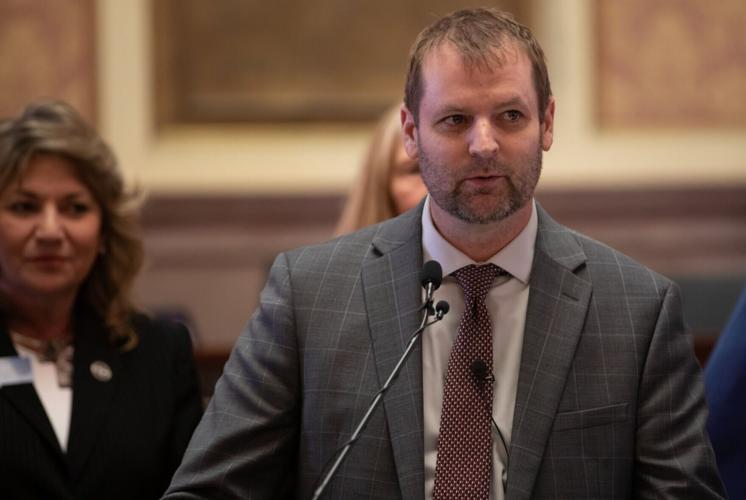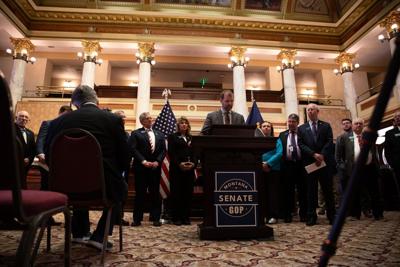The 69th Montana Legislature adjourned Wednesday after passing sweeping property tax legislation and a far-reaching spending bill, but not before a final dose of drama in the Senate.
The headlining policies such as property tax relief and the GOP’s judicial reform agenda were the fodder of the final days after a contentious, often bitter Legislature.
This session was marked by huge bill packages that caused tough debates and deep divisions within the Republican party, particularly in the Senate.
Republican Senate President Matt Regier described the past four months as “an extraordinary session in the most literal sense of the word.”

Senate President Matt Regier speaks at a press conference following the final day of the 2025 Montana Legislature.
The 2025 Legislature fell into so many melees that it was almost an afterthought by Wednesday that one Republican legislator in the House resigned over disagreement with his party leaders about vaping bills. Another was banned by his peers from the Senate floor for life for his attempts to steer a state contract toward a longtime friend who wasn’t qualified for the work.
“This is the worst session I’ve seen,” said Alan Olson, a lobbyist for NorthWestern Energy and former lawmaker who has been coming to the Capitol since the mid-1980s. “Nobody can express a civil word to anybody else up here.”
The Senate’s habitual streak of division continued on the session’s last day.
Lawmakers devolved into speeches arguing against the sine die motion to adjourn due to lasting frustration over rifts among GOP senators and a brief fight over rules that govern the body. The first Senate vote to adjourn failed 8-42 after some scathing remarks from hardline Republicans against their mostly moderate counterparts who allied with Democrats again and again this session.
“We’re going to quit because we’re done?” Sen. Daniel Zolnikov, R-Billings, said in a fiery speech. “I don’t think we’ve even shown up. So with that, I'm a hard no, because again, massive failure. Whatever this was, if this is how we legislate, we have a problem. This is how D.C. does it.”
Moments later, the final sine die motion passed 36-14.
Over in the House, the session’s close was relatively uneventful, save for a few moments where tensions rose. And a move to make Montana’s courts partisan — one of the most hot-button issues of the session — made a quiet last-minute appearance after being defeated elsewhere.
The only sine die motion passed easily in the lower chamber.
But many lawmakers on both sides of the aisle and in both chambers were united on at least one thing on the final day: There was frustration over what some described as predetermined outcomes on key votes.
“The cake is baked” and a string of metaphors inspired by the adage became common refrains throughout the Capitol this session, including on its final day.
During the final House floor debate, there were references to making new layers of cake, and even stepping in cake. A couple days earlier, one Republican lawmaker from Great Falls made dozens of cupcakes that read “baked in” as a cheeky nod to the feeling that much of what comes out of the Capitol is decided before votes are cast.
One of the policies that instigated the accusations that the outcome was predetermined was property tax relief, the main task legislators had to deliver on this session.
“When we got here, this policy was already decided,” said Rep. Jane Gillette, R-Three Forks, who voted against the legislation. “You know, unfortunately it's our constituents that have to eat that stale, moldy piece of cake now that we’re about to give them. And I’m just, again, disappointed in what we've done.”
The property tax package lawmakers passed Wednesday is set to lower residential property tax bills for primary residences across Montana and provide a $400 rebate for most primary residences this year. Those with second homes and short-term rentals will see their bills go up, as will the state’s largest businesses, utilities and pipeline companies, a feature of the legislation that incited last-minute anger and accusations of an unfair tax shift.
The other major piece of legislation that was passed in the session’s final minutes was House Bill 863, which also spurred lawmakers to return to their cake metaphors. The bill, sponsored and steered by Rep. Llew Jones, R-Conrad, started as a proposal worth $100,000. It is now worth millions and acts as a landing place for a number of items, some of which were voted down earlier in the session.
HB 863 split Democrats and Republicans and incited ire on both sides of the aisle. Opponents were critical about the process, lamenting the revival of legislation the chambers had already voted down.
Jones saw it differently.
“It’s an empty vessel to solve the problems at the end of the session,” he said. “There were just pieces that fell off the plate that we needed to reach out and pick back up.”
Frustration over “predetermined” outcomes was inextricably linked to Jones, who often shoulders much of the blame for brokering deals, whipping votes behind the scenes and using novel strategies to ensure none of his priorities die off.
House Majority Leader Steve Fitzpatrick, R-Great Falls, called Jones a “powerhouse” Wednesday.
“We’re going to be talking about Rep. Jones for 20 to 30 years from now,” he said.
Months before Wednesday’s adjournment, lawmakers took care of another chief task: deciding whether or not to renew Medicaid expansion. Lawmakers chose to continue the joint federal-state program that provides health care to roughly 77,000 low-income Montanans, and removed the sunset date that forced legislators to vote on whether or not to maintain the program every few years.
Another priority policy issue for Republicans this session was judicial reform, born out of frustration from the GOP toward the courts, where many of their most controversial policies have been struck down on legal challenges. The majority of those proposals were defeated, save for a few of the smaller measures.
The crown jewel of that package was a number of bills to make nonpartisan judicial races partisan affairs. That proposal came in multiple forms and was repeatedly defeated by Republicans who joined all Democrats.
For a brief moment Wednesday, the Legislature stalled because some lawmakers were anticipating Gov. Greg Gianforte was going to insert an amendment into a still-alive bill to create partisan courts in Montana. That amendment ultimately never came. Republican Speaker of the House Brandon Ler said the measure did not have the votes to prevail in the last moments of the session, but that it was worth the shot.
“I wasn’t gonna give up on it easy,” he said.
The governor’s office did not immediately respond Wednesday to requests for comment.
Whispers of a sine die motion being called on Wednesday had become an open secret days before lawmakers entered the building.
Some lawmakers wore flashy ties with “sine die” written down the front. The Capitol snack bar had a hand-drawn forecast by the cash register calling for “100% chance of mild chaos and 90% chance of sine die.” A handful of legislators living in rental units said their cars were already packed since their leases were up that day, April 30.
As is tradition, lawmakers who will term out of their respective chambers gave speeches.
Sen. John Esp, the Big Timber Republican and the longest-serving Senate member, read an excerpt from a 2001 journal entry he wrote during his first session in Helena.
“We get few chances in life to experience something like this,” he read.
Senate Minority Leader Pat Flowers’ remarks struck a similar chord. The Belgrade senator shared a story of his first summer in Montana spent doing forest work near Ovando that impressed upon him a simple truth he’s since held onto as a legislator.
“In simple terms, what that taught me is that Montanans take care of each other,” Flowers said.
Democrats saw more opportunities to advance their priorities this session than the last, when Republicans wielded a supermajority in both chambers. House Minority Leader Katie Sullivan, D-Missoula, made note of the better footing on Day One.
“This has been a night-and-day difference,” she told reporters. “... It has been because of the 12 more seats we’ve had in this building that Democrats have been able to bring these issues to the table.”
Yet for all the last-day nods to nostalgia and bipartisanship, the Senate’s working majority tried to flex its power one final time in a last-minute bid to resurrect a bill that would have charged luxury vehicle owners higher registration fees. Proceeds would have gone toward local bridge projects and victims of crimes.

House Minority Leader Katie Sullivan, D-Missoula, smiles while talking to a fellow rep. during the final day of the 2025 Montana Legislature.
Senate Bill 324 was sponsored by Sen. Josh Kassmier, the leader of “The Nine” and an ally this session of Jones and Gianforte’s office.
Earlier that day, he told the Montana State News Bureau that any suggestion the cake had been baked this session was a fallacy, despite countless votes over the last four months that illustrated otherwise.
“There are so many independent thinkers,” Kassmier said. “There’s no way you can guarantee a vote on the Senate floor.”
That appeared to be true in the final vote of the 2025 legislative session.
What had been a nearly impenetrable voting bloc with Kassmier at the helm fractured.
The bill died on a tie vote.












(0) comments
Welcome to the discussion.
Log In
Keep it Clean. Please avoid obscene, vulgar, lewd, racist or sexually-oriented language.
PLEASE TURN OFF YOUR CAPS LOCK.
Don't Threaten. Threats of harming another person will not be tolerated.
Be Truthful. Don't knowingly lie about anyone or anything.
Be Nice. No racism, sexism or any sort of -ism that is degrading to another person.
Be Proactive. Use the 'Report' link on each comment to let us know of abusive posts.
Share with Us. We'd love to hear eyewitness accounts, the history behind an article.